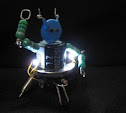
It uses pyastra (python assembler translator) and gpasm assembler.
The PyQt GUI has a QScintilla-based editor for easy editing of the python scripts to be compiled.
main.py : (compatible with Portable Eric 4 Python IDE)
#################################
# Python (pseudo) Compiler for PIC12 and PIC16 devices
# using pyastra and gpasm
# PyQt GUI by yus
#################################
import sys, os
from PyQt4.QtGui import *
from PyQt4.QtCore import *
from PyQt4.Qsci import QsciScintilla, QsciLexerPython
class ScriptEditor(QsciScintilla):
def __init__(self):
QsciScintilla.__init__(self)
self.filename = None
self.filedialog = QFileDialog()
# font
font = QFont()
font.setPointSize(9.5)
# Choose python lexer
lexer = QsciLexerPython()
lexer.setDefaultFont(font)
self.setLexer(lexer)
# Folding visual : we will use boxes
self.setFolding(QsciScintilla.BoxedTreeFoldStyle)
# Braces matching
self.setBraceMatching(QsciScintilla.SloppyBraceMatch)
# Editing line color
self.setCaretLineVisible(True)
self.setCaretLineBackgroundColor(QColor(200, 240, 200))
# line numbers
self.setMarginWidth(0, QFontMetrics(font).width( "00000" ) )
def open(self):
self.filename = self.filedialog.getOpenFileName(None,
'Open Python Script', '.\\',
'python script(*.py);;text file(*.txt);;All files (*)', QString())
try:
f = open(self.filename)
self.setText(f.read())
f.close()
except:
print 'unable to open script.'
def save(self):
if self.filename == None:
self.save_as()
else:
try:
f = open(self.filename, "w")
f.write(str(self.text()))
f.close()
except:
print 'file not save.'
def save_as(self):
self.filename = self.filedialog.getSaveFileName(None,
'Save Python Script', '.\\',
'python script(*.py);;;text file(*.txt);;All files (*)', QString())
if self.filename != None:
self.save()
def get_filename(self):
return self.filename
class AppWindow(QMainWindow):
def __init__(self):
QMainWindow.__init__(self)
self.setWindowTitle('PIC12-PIC16 Python Compiler ( PyQt, PyAsTra and GPASM ) - yus ')
#self.setMinimumSize(700, 320)
#self.move(20, 20)
self.editor = ScriptEditor()
self.open_btn = QPushButton('Open')
self.save_btn = QPushButton('Save As')
self.device_label = QLabel('Select Device:')
self.status_info = QLabel('Select or create a python script first')
self.device_cbox = QComboBox()
self.compile_btn = QPushButton('Compile Script')
self.compile_btn.setEnabled(False) # initially disabled until a script is opened
self.editor_area = QDockWidget('(pic script here)')
self.editor_area.setWidget(self.editor)
self.addDockWidget(Qt.TopDockWidgetArea, self.editor_area)
self.output_info = QTextEdit()
self.output_info.setReadOnly(True) # read only information
self.output_info.setTextColor(Qt.darkBlue)
self.output_info_widget = QDockWidget('Output Information')
self.output_info_widget.setWidget(self.output_info)
self.addDockWidget(Qt.BottomDockWidgetArea, self.output_info_widget)
file_tbar = QToolBar()
file_tbar.addWidget(self.open_btn)
file_tbar.addWidget(self.save_btn)
compile_tbar = QToolBar()
compile_tbar.addWidget(self.device_label)
compile_tbar.addWidget(self.device_cbox)
compile_tbar.addWidget(self.compile_btn)
self.addToolBar(file_tbar)
self.addToolBar(compile_tbar)
self.status = QStatusBar()
self.status.addWidget(QLabel('\t')) # dummy widget
self.status.addWidget(self.status_info, 1)
self.setStatusBar(self.status)
self.update_device_list()
self.connect(self.save_btn, SIGNAL('clicked()'), self.save_script)
self.connect(self.open_btn, SIGNAL('clicked()'), self.open_script)
self.connect(self.compile_btn, SIGNAL('clicked()'), self.compile_script)
def open_script(self):
self.editor.open()
fname = str(self.editor.get_filename())
self.editor_area.setWindowTitle(fname)
if fname != 'None':
self.compile_btn.setEnabled(True)
def save_script(self):
self.editor.save_as()
fname = str(self.editor.get_filename())
self.editor_area.setWindowTitle(fname)
if fname != 'None':
self.compile_btn.setEnabled(True)
def compile_script(self):
self.editor.save() # save changes in the script before compiling
script = str(self.editor.get_filename())
device = str(self.device_cbox.currentText())
# PyAstra (python assymbly translator)
pyastra_command = '.\\pyastra_console.py -p'+device[3:] + ' -S --compile ' + script
msg = ' from pyastra console :\n'
try: # clean/delete previous output files
for ext in ('asm', 'hex', 'lst', 'cod'):
os.remove(script[:-2] + ext)
except:
pass #print 'one or more files not found'
try:
msg += os.popen(pyastra_command).read() # execute pyastra console
self.output_info.setText(msg) #pyastra.py info
except:
self.output_info.append('Error occured while translating the python script')
if msg.find('Program memory usage')>0:
# assemble the generated asm file using gpasm.exe
self.output_info.append('---------------\nExecuting gpasm.exe....')
file_asm = '%s'%self.editor.get_filename()
file_asm = file_asm[:file_asm.find('.py')] + '.asm'
#self.output_info.append( os.popen('.\\gpasm\\gpasm -v').read() ) # show gpasm version
msg = os.popen('.\\gpasm\\gpasm -I .\\gpasm\\header '+file_asm).read()
self.output_info.append(msg)
self.output_info.append('Finished.')
self.status_info.setText('Done')
else:
self.status_info.setText('Please verify the script')
def update_device_list(self):
for root, dirs, files in os.walk('.\\pyastra\\ports\\pic14\\procs'):
for name in files:
device = str(name)
if device[:1]=='1' and device.find('.pyc')<0 and device.find('i')<0:
device = device[:device.find('.')]
self.device_cbox.addItem('pic'+device)
self.device_cbox.setCurrentIndex(127) # initially set to PIC16F876A
if __name__ == '__main__':
app = QApplication(sys.argv)
form = AppWindow()
form.show()
sys.exit(app.exec_())
Complete Eric4 project : Python for PIC.rar
* already includes pyastra and gpasm
note: Python programming language is really NOT intended for platform/devices with very limited resources, such a microcontroller with a very small memory. For now, C language is still the widely used in microcontroller programming.
forum link: Python Compiler for PIC MCUs



this is very brilliant, thanks for sharing.
ReplyDeletesolat sunat taubat
production house in malaysia
Daftar Syarikat